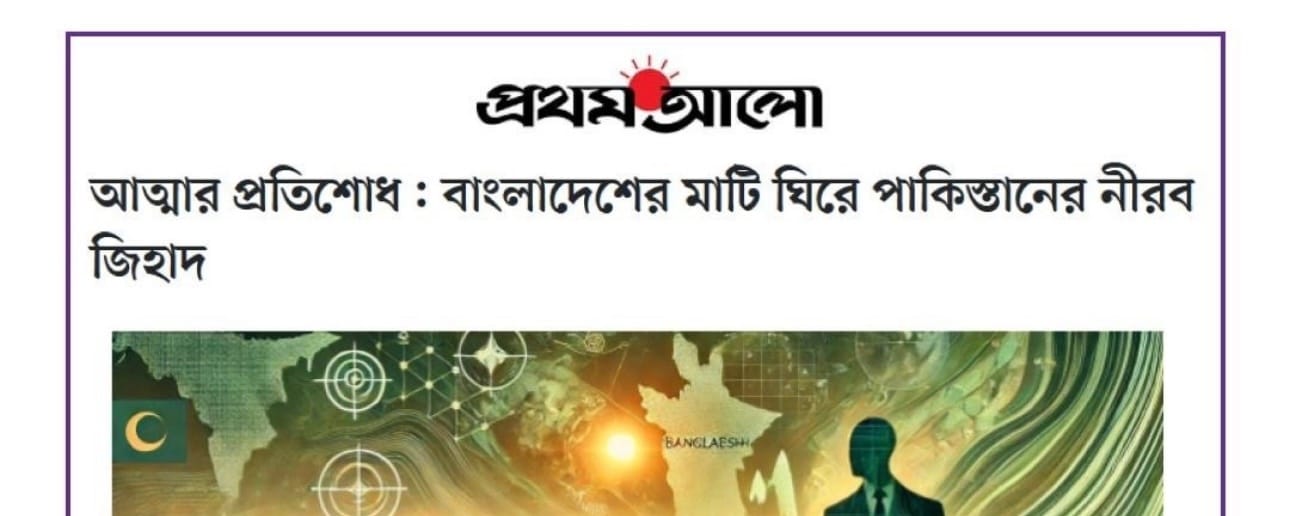Revenge of the Soul: Pakistan’s Silent Jihad Encircling Bangladesh’s Soil

Pakistan’s Return Through the Back Door by Imran Ahmed Chowdhury
Even after fifty years of Bangladesh’s independence, the humiliation of 1971 remains etched in Pakistan’s national psyche. Defeated militarily, Pakistan now seeks re-entry through covert means—propaganda, influence, and ideology. Instead of deploying soldiers, clandestine operatives infiltrate through the back door, aiming to destabilize India’s northeastern region and sow seeds of division within Bangladesh. Utilizing religious sentiments, political ideologies disseminated among students, and the tacit support of retired military officials, a shadow alliance is forming. This new front has the potential to ignite silent turmoil along the India-Bangladesh border.
Avenge Defeat with New Strategies: The birth of Bangladesh in 1971 marked Pakistan’s most significant military defeat. However, Pakistan never closed that chapter—only altering its tactics. Replacing guns and explosives with Telegram chats, madrasa-based influence, and distorted historical narratives, Pakistan’s intelligence networks, including the ISI, endeavor to transform Bangladesh into a strategic playground once more. This plan extends beyond unsettling India’s northeastern territories; it embodies a psychological vendetta for past defeats.
Ideological Resurgence Within Bangladesh: In certain educational institutions in Dhaka, mosque sermons, and even youth gatherings, echoes of old ideologies in new tones are emerging. Pan-Islamism, anti-India rhetoric, and distorted interpretations of the 1971 Liberation War are resurfacing. Notably, some retired military officers harboring anti-India sentiments are silently endorsing this propaganda, providing Pakistan with a perilous opportunity to exploit.
Jamaat’s Shadow in a New Form: Although the political relevance of Jamaat-e-Islami, accused of war crimes, has diminished, its ideologies persist in certain circles. Pakistan listens to these familiar tunes and attempts to forge new connections. Recent allegations of Rohingya leader Ataullah Abu Ammar Jununi’s links to Pakistan have raised fresh alarms in intelligence communities. Pakistan’s old strategy of “bleeding by a thousand cuts” is re-emerging—this time with eyes set on northeastern India, using Bangladesh’s soil as a potential base.
Targeting the Economy Under the Guise of Religion: India’s northeastern region is on a path of development, with increasing connectivity, investment, and tourism. However, to disrupt this peaceful progress, Pakistan recognizes that a few drops of extremist ideology can be more effective than bombs. For Bangladesh, this influence poses risks: deterring foreign investment, destabilizing political harmony, and tarnishing its international image.
Infiltrating Political Voids with Conspiracies: In Bangladesh’s current political landscape, the struggle for power overshadows ideological battles. In efforts to counter each other, some political parties and leaders are willing to compromise with forces lacking national loyalty. External influential powers exploit this political vacuum. Pakistan understands that mass support isn’t necessary—just a few student leaders, former officers, and religious speakers suffice. Influence spreads virally, rendering weapons unnecessary.
Not Policy, But Bloodthirsty Revenge: This isn’t merely a strategic plan; it’s a mission of vengeance. The defeat of 1971 inflicted wounds on Pakistan’s national identity. Now, they seek to rewrite history inversely—regaining control over Bangladesh to avenge their loss. It’s a form of psychological warfare, waged under the guise of religion, in the name of community, and from beyond borders.
Final Words: Targeting the Quiet Ones: While the world focuses on China and the Indo-Pacific, another silent storm brews in this region. Bangladesh’s narrative is no longer solely about development—it’s also a battleground for an unspoken, invisible war. Pakistan isn’t sending armies; they’re returning through sermons, WhatsApp groups, and overseas ‘mentors.’ For those who remain oblivious, the battle may be lost before it’s even recognized.
Reply